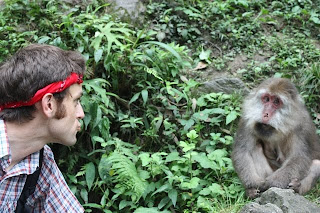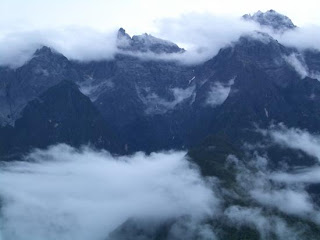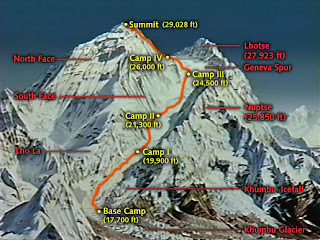Brief Wondrous Life of Oscar Wao: Junot Diaz
Really effective, surprising and engaging book that I just loved. Turns the tired tropes of the first-generation immigrant narrative on their heads with humor and grace, and is a pure pleasure to read. This, the multigenerational story of an Dominican family surviving the dictatorship of Trujillo, then the new traumas of immigration and family dynamics. Overflowing, at times overwhelming, with its sex and violence, but never gratuitously. Can't recommend this one highly enough. And so good it got me to re-read...
Drown: Junot Diaz
Yeah, amazing short stories by Diaz, some better than others, but still an amazing short story collection about Dominican families in New York and New Jersey.
Goodbye Columbus:
The Human Stain - Philip Roth
Yep, the Philip Roth kick continues ever onward. I found this dragged a little more than American Pastoral which I read last month, although I still enjoyed it. The more Roth I read though, the more his own unhappiness, bitterness and misogyny starts to leak through. Still, an interesting study of identity, identity politics, sexuality, academia and the second half of the twentieth century.
Goodbye Columbus - Philip Roth
After the few darker Roth novels I read this year, this love story novella was a breath of fresh air. Capturing the conflicts of class and the confines of the era's conformity (1950's/60's America), this was a wonderful adolescent love story of passion and heartbrake. Star-crossed lovers I suppose, but not a tragedy in the classic sense. Surprisingly sweet for Mr. Roth, but I suppose it was his first book...
Portnoy's Complaint - Philip Roth
Are we sensing a theme this fall?
Okay, so I really enjoyed this, and found it fascinating as it is so damn famous, and wow, there really is a lot of masturbation in this book. Funny probably to read it so late after publication, and I can understand its impact at the time, and though hilarious at times, it didn't do a ton for me reading it now. In fact, it kind of made me feel icky in the way that reading Bret Easton Ellis will make me feel like taking a shower in bleach after I read one of his books. Further, it really continued to reveal to me the depths of Roth's bitterness and anger toward the world. My thought process "Wow, he really hates shiksa women... oh, I guess actually he just really hates women in general and is a misogynist... oh, now I can see that he just really really hates people."
Shopclass as Soulcraft - Matthew Crawford
A meditation/manifesto on the value of certain manual labor- craftsmanship to be most specific, over being an intellectual or physical cog in the larger production/consumption machine. Crawford himself is a PhD who became a motorcycle mechanic, and speaks of the joys, creative stimulation and good income that comes from craftsmanship, not to mention the self-esteem and self-efficacyt that emerges from problem solving work. Sure, he gets a little moralistic and rigid at times, but overall a solid critique of what we currently call capitalism and its soul-destroying nature in the American corporate version of it. In a lot of ways, he's speaking to and for the very same ideology of a book like "Fight Club," just in a less angry voice, and without the more problematic gender politics of that book. I'd highly recommend this to anyone in education, or in mental health for that matter, as it does tell us something about why our world as we know it is so unsatisfying.
Sway- Ori & Rahm Brafman
Yep -the standard book I love to read, pop social psychology stuff. However, this one had two sections I would recommend be mandatory reading for anyone becoming a therapist- one on theories behind the bullshit rise in bipolar diagnosis (and not a corresponding rise in suicide and bipolar behaviors at the epidemiological level) and another on the depressing/fascinating neurobiology of greed- yep, making money gives people the same rush in the reward centers of the brain as cocaine, and leads to similarly immoral behavior. And we wonder why ethics crumble in the face of money...
The Invisible Gorilla: Christopher Chabris and Daniel Simons
Do people know about the Invisible Gorilla study? Now a classic of psych 101 (but not when I took it 15 years ago!). Amazing experiment about attention, "inattentional blindness" and how we are deceived by perception. The book covers that, and then branches out into more generally how to not draw conclusions from data. It would be great for an intro psych course, also explaining why recent grads of med school overdiagnose pathologies (pay attention fellow early career shrinks!), explains the most egregious attribution errors in scientific research and how we stumble into them and how to avoid such pitfalls of trusting intuition over hard-headed analysis, and takes a few swpes at malcolm gladwell along the way. Anyone teaching psych 101 or with a passing interest in psychology, check this one out.
The Dharma Bums: Jack Kerouac
So, I'm revisiting a lot of books I should have read while in college, when I... had some different priorities. The point is, I'm a little older and wiser now than at the peak time I probably would have enjoyed some books more. Which is to say- although there was a lot to like about The Dharma Bums, its sort of a fundamentally adolescent book, and although there is nothing wrong with that, I just would have liked it more when I was younger or in a different place in my life. Would I recommend it? Yes, but more as a document/artifact that a pleasure read or anything enlightening about Buddhism or as literature. All told though, it was a fun read, and I do understand why its so beloved.
The Dharma Bums: Jack Kerouac
So, I'm revisiting a lot of books I should have read while in college, when I... had some different priorities. The point is, I'm a little older and wiser now than at the peak time I probably would have enjoyed some books more. Which is to say- although there was a lot to like about The Dharma Bums, its sort of a fundamentally adolescent book, and although there is nothing wrong with that, I just would have liked it more when I was younger or in a different place in my life. Would I recommend it? Yes, but more as a document/artifact that a pleasure read or anything enlightening about Buddhism or as literature. All told though, it was a fun read, and I do understand why its so beloved.
The Mindful Path to Self-Compassion: Christopher Germer
* * * * *
When I was in grad school for psychology, I very nearly wrote my dissertation on the history of self-help books, before writing about meditation with kids and teens. (a much better choice) I still have a place in my heart for self-help books, crappy and otherwise, and their anthropological value. I went crazy with some recent classics not so much in the self-help, but self-improvement realm recently:
How to Win Friends and Influence People - Dale Carnegie
Um, wow- I get why this is a classic. Its really really good and helpful tips on succesfully living in the world of people, whether you are a business person or parent or just someone who has to interact with people. Also unrelentingly positive, and articulates so many basic principles from Ancient Eastern and Western thought, or that could easily be articulated in today's positive psychology. Good stuff. I'm going to start throwing it a my shy and anxious patients.
48 Laws of Power - David Greene
Hot on the heals of Dale Carnegie I decided to check out the polar opposite self-improvement book, partly out of sheer anthropological curiousity about this Machiavellian update and apparent hip-hop bible. Verdict? This book is seriously godawful, not because of the amorality, but the atrociously hammy writing, and embarrassingly, hilariously enormous oversights where it directly contradicts itself (ie, court attention at all costs- any publicity is good publicity, and guard your reputation its priceless). Anyway, again, why did I read this? I guess it was a moderately amusing glimpse of what second-rate wanna-be MBA types fancy to be intellectual reading and keep prominently on their faux-mahoganey shelves. I kept imagining the Christopher Moltisanti's lackeys from the Sopranos.
How to Make People Like You in 90 Seconds or Less- Nicholas Boothman
Yet another book in the self-improvement anthropological study this month, this one an apparent classic in the annals of "neuro-linguistic-programming." Kind of ridiculous in its purported science of following people's speech, body language and other preferences to communicate more effectively, it was kind of interesting, if kind of bullshit. It is however, a great title for a book.
10 Qualities of Charismatic People: Tony Alessandro
When I was in grad school for psychology, I very nearly wrote my dissertation on the history of self-help books, before writing about meditation with kids and teens. (a much better choice) I still have a place in my heart for self-help books, crappy and otherwise, and their anthropological value. I went crazy with some recent classics not so much in the self-help, but self-improvement realm recently:
How to Win Friends and Influence People - Dale Carnegie
Um, wow- I get why this is a classic. Its really really good and helpful tips on succesfully living in the world of people, whether you are a business person or parent or just someone who has to interact with people. Also unrelentingly positive, and articulates so many basic principles from Ancient Eastern and Western thought, or that could easily be articulated in today's positive psychology. Good stuff. I'm going to start throwing it a my shy and anxious patients.
48 Laws of Power - David Greene
Hot on the heals of Dale Carnegie I decided to check out the polar opposite self-improvement book, partly out of sheer anthropological curiousity about this Machiavellian update and apparent hip-hop bible. Verdict? This book is seriously godawful, not because of the amorality, but the atrociously hammy writing, and embarrassingly, hilariously enormous oversights where it directly contradicts itself (ie, court attention at all costs- any publicity is good publicity, and guard your reputation its priceless). Anyway, again, why did I read this? I guess it was a moderately amusing glimpse of what second-rate wanna-be MBA types fancy to be intellectual reading and keep prominently on their faux-mahoganey shelves. I kept imagining the Christopher Moltisanti's lackeys from the Sopranos.
How to Make People Like You in 90 Seconds or Less- Nicholas Boothman
Yet another book in the self-improvement anthropological study this month, this one an apparent classic in the annals of "neuro-linguistic-programming." Kind of ridiculous in its purported science of following people's speech, body language and other preferences to communicate more effectively, it was kind of interesting, if kind of bullshit. It is however, a great title for a book.
10 Qualities of Charismatic People: Tony Alessandro
Yeah, I don't know, really just more of the same as these other three books above...

.jpg)
















